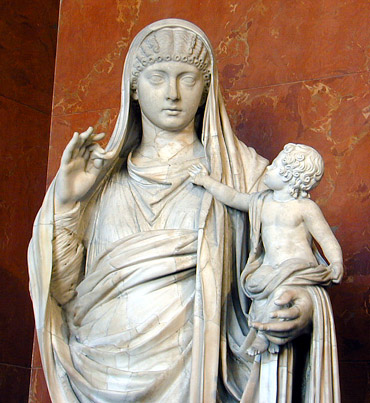 Marble statue of Messalina holding her son Britannicus, 45 CE |
Messalina's name became a byword for the abusive and sexually transgressive empress. She not only flagrantly violated her marriage vows, but, taking on male prerogatives, she elected to marry a younger man outside the imperial family, in effect divorcing her husband Claudius (Emperor 41-54 CE) and challenging his power. Valeria Messalina (?25-48 CE) was a direct descendant of Octavia, Augustus's sister, through both parents, Marcus Valerius Barbatus and Domitia Lepida. Some thirty years his junior (her actual birth date is disputed), she became her cousin Claudius's third successive wife. She bore him a daughter, Claudia Octavia, who became the wife of Nero (Emperor 54-68 CE) , and a son, Britannicus. Her love affairs, known to all except her doting husband, are variously attributed to her lustful nature, her Julian appetite for power, and her attempts to secure her son's succession. It is possible that after her execution in 48 CE stories about her were exaggerated and cruelties of Claudius were attributed to her in order to exonerate the emperor and ensure his popular support. However, ancient sources (Tacitus Annales XI.2 ff., Suetonius Vita Divi Claudi 17-39 passim, and Juvenal Saturae 6.115-132 and 10.329-345) portray her as a vicious woman who chose to live at will, flaunting social conventions. At the very least she rejected traditional gender boundaries. For more about Messalina, see Joshel's article (1995) and later essay in Hallett & Skinner, Roman Sexualities (1997) in the Bibliography. |
Chapter 12 opens with Tacitus’s statement that Agrippina Minor and her son Lucius Domitius (later Nero, after adoption by Claudius), who were favorably regarded by the populace because of their fondness for the dead Germanicus (Agrippina's father, Nero's grandfather), were targeted by Messalina -- perhaps because of their popularity --, and that she would have plotted against them but “she was distracted by a new love, even akin to madness” (novo et furori proximo amore distinebatur). Ironically, not long after her death, Agrippina and Nero replaced Messalina and her son in Claudius's affections and his palace.
| nam in C. Silium, iuventutis Romanae pulcherrimum, ita exarserat ut Iuniam Silanam, nobilem feminam, matrimonio eius exturbaret vacuoque adultero poteretur. |
| neque Silius flagitii aut periculi nescius erat: sed certo si abnueret exitio et non nulla fallendi spe, simul magnis praemiis, operire futura et praesentibus frui pro solacio habebat. |
| illa non furtim sed multo comitatu ventitare domum, egressibus adhaerescere, largiri opes honores; postremo, velut translata iam fortuna, servi liberti paratus principis apud adulterum visebantur. |
Click on the underlined words for translation aids and commentary, which will appear in a small window. Close the small window after each use.